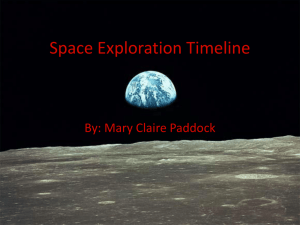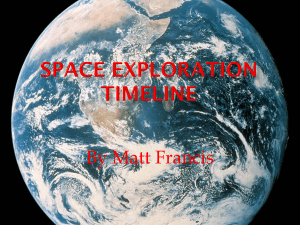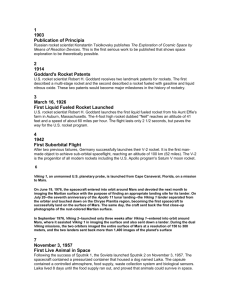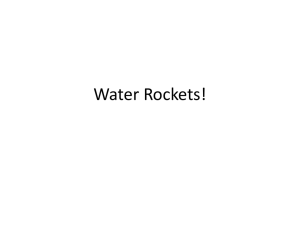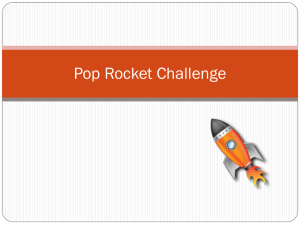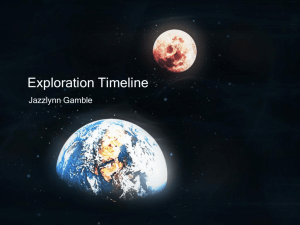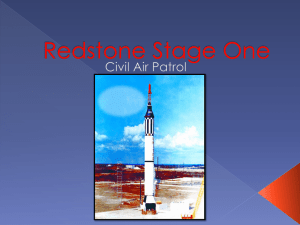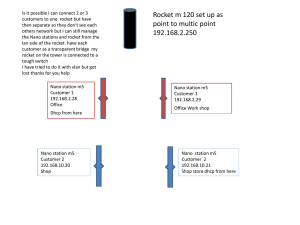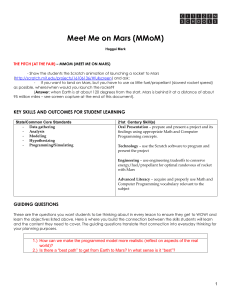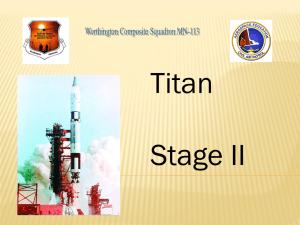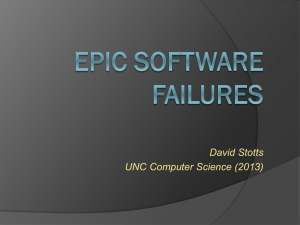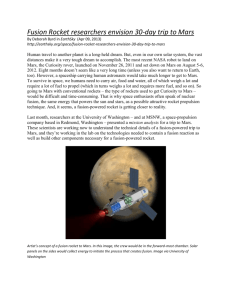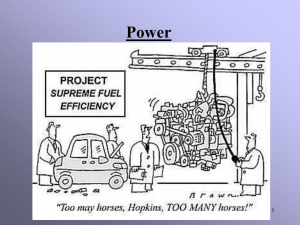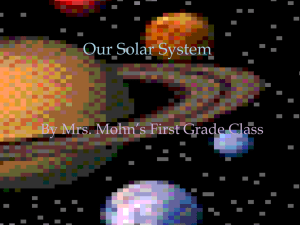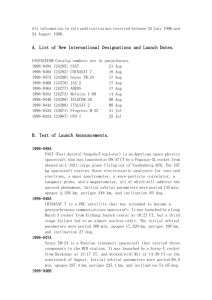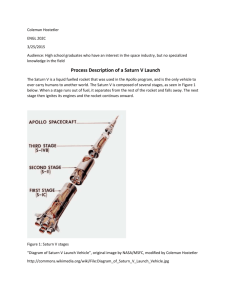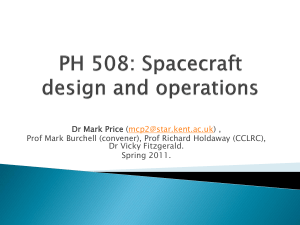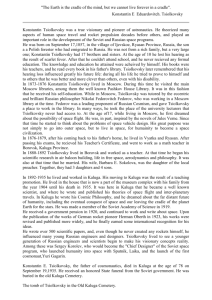7402-20110310221728
advertisement
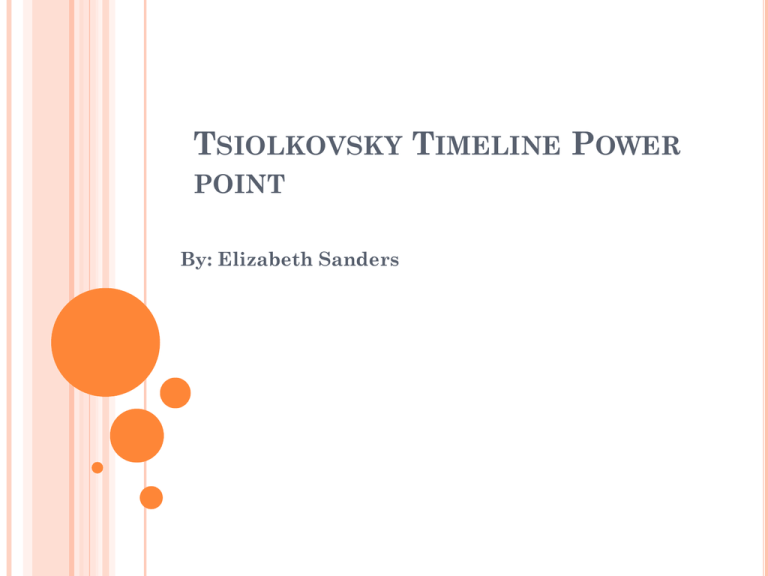
TSIOLKOVSKY TIMELINE POWER POINT By: Elizabeth Sanders 1900 Tsiolkovsky started testing rockets in 1900. 1903- Publication of Principia Russian rocket scientist Konstantin Tsiolkovsky publishes The Exploration of Cosmic Space by Means of Reaction Devices. This is the first serious work to be published that shows space exploration to be theoretically possible. 1914 Goddard's Rocket Patents U.S. rocket scientist Robert H. Goddard received two landmark patents for rockets. The first described a multi-stage rocket and the second described a rocket fueled with gasoline and liquid nitrous oxide. These two patents would become major milestones in the history of rocketry. ( He patented the first rocket in 1914.) 1926 March 16, 1926 First Liquid Fueled Rocket Launched U.S. rocket scientist Robert H. Goddard launched the first liquid fueled rocket from his Aunt Effie’s farm in Auburn, MA. The 4-foot high rocket dubbed “Nell” reached an altitude of 41 feet and a speed of about 60 miles per hour. The flight lasted only 2 ½ seconds, but paved the way for the U.S. rocket program. 1930 German Wernher Von Braun and his colleagues produced a number of experimental designs, the most famous of which was the A-4 rocket, which has gained distinction in history under another name -- the vengeance weapon number two -- V-2 for short. The V-2 was the first successful, long range ballistic missile, and von Braun is credited as its principal developer. 1944 September 8,1944 First German V-2 fired in combat exploded in Paris; the second struck London a few hours later. Germany is responsible. 1954 May 24, 1954 NRL Martin Viking #11 set an altitude record of 158 miles ( 834,240 ft) and attained a speed of 4,300 mph in a flight from White Sands Proving Ground, New Mexico which is in the US. 1957 October 4, 1957 First Artificial Satellite The USSR beat the United States into space by launching Sputnik 1. At 184 pounds, it was the world's first artificial satellite. Sputnik transmitted radio signals back to Earth for only a short time, but it was a major accomplishment. Countries responsible: US, and Russia and many more. 1961 It was in active service with the U.S. Army in West Germany. It was retired by the U.S. in 1964, though in 1967 a surplus Redstone helped launch Australia's first satellite US is responsible for this Retirement. This is when the Redstone rocket lifted. 1961 April 12, 1961 First Man in Space Russian Cosmonaut Yuri Alekseyevich Gagarin became the first human to go into space. The Vostok 1 spacecraft made one complete orbit around Earth in 108 minutes, and reached altitudes of 112 to 203 miles. The flight lasted only one hour and 48 minutes. 1967 February 5, 1967 was the launch date. The primary objective of Lunar Orbiter 3 was to continue the Orbiter 1 and Orbiter 2 task of photographing promising areas of the lunar surface to determine their adequacy as Apollo and/or Surveyor landing sites. 1969 July 20, 1969 First Manned Moon Landing Apollo 11 makes the first successful soft landing on the Moon. Neil Armstrong and Edwin Aldrin, Jr. become the first people to set foot on another world. US is responsible. 1971 April 19, 1971 First Space Station The Salyut 1 station is launched by the U.S.S.R. It remained in orbit until May 28, 1973. The USSR is Russia and some other countries. 1971 November 13, 1971 First Spacecraft to Orbit Another Planet USA- American probe Mariner 9 took photos on Mars and was the first spacecraft to orbit another planet. 1972 April 16, 1972 launch date The country responsible is the US. Apollo 16 landed on the moon and had the lunar rover onboard. 1973 May 14, 1973 First U.S. Space Station USA launches Skylab the first US space station. It is there for scientific experiments and was occupied by 3 crews. 1973 May 25, 1973 First Skylab Crew America launches first crew aboard the Skylab. The crew fixes damage by Skylab station during it’s launch. 1976 July 20, 1976 First Surface Images of Mars The first pictures of the surface of Mars and martian soil are sent back to Earth by Viking 1, the first U.S. spacecraft to successfully land a on another planet. The US is responsible 1979 Skylab shows the image of the sun’s corona. During its operational life, numerous scientific experiments were conducted, and crews were able to confirm the existence of coronal holes in the Sun. The US is responsible. 1981 April 12,1981 First Space Shuttle Launch The first manned mission from the Space Transportation System, Colombia is launched. It was the first re-usable shuttle. 1983 April 4, 1983 Maiden Voyage of Challenger America's second Space Shuttle, Challenger, embarks on its first mission into space. The mission includes America's first space walk in nine years. The US is responsible. 1986 February 20, 1986 Mir Station Launched The first phase of the Mir Space Station has been successfully launched and put into Earth’s orbit. 1990 April 24, 1990 Launch of Hubble Space Telescope Space Shuttle Discovery lifted off for mission STS-31 carrying the Edwin P. Hubble Telescope with it. 1995 December 7, 1995 Galileo Arrives at Jupiter The Galileo spacecraft arrives at Jupiter and a probe is dropped into the planet's atmosphere. The orbiter will spend the next two years orbiting and studying the planet and its moons. 1996 July 4, 1996 Mars Pathfinder Lands on Mars The Mars Pathfinder probe lands on the surface of Mars. A small robotic rover examines the nearby terrain, sending back amazing images of the planet's surface. 1998 First modules of the International Space Station launched The 2 countries are: the US and Russia.
